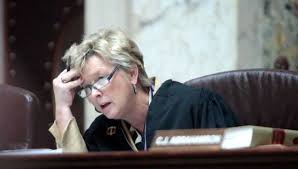Recusal in John Doe case raises questions of fairness, purpose

By M.D. Kittle | Wisconsin Reporter
MADISON, Wis. — A Wisconsin Supreme Court justice’s recusal is raising questions about the court’s role in an investigation that conservatives charge is aimed at derailing Gov. Scott Walker’s 2014 re-election campaign — and his presidential prospects in 2016.
Justice Ann Walsh Bradley begged off a case involving a Democrat-launched secret probe of conservative political groups. Three unnamed petitioners are asking the court to stop the politically charged John Doe probe that has spanned more than a year and a half.
HIGHER GROUND? Wisconsin Supreme Court Justice Ann Walsh Bradley, part of the court’s liberal minority, says she is recusing herself from a case involving the secret John Doe investigation into conservatives. But Bradley’s letter accusing the court of “lapses in recusal practices” seems like she is going out of her way to “kick dirt on her colleagues,” says a Wisconsin legal expert close to the John Doe probe.
Wisconsin’s John Doe law grants grand jury-like powers to judges overseeing the secret probes — without the benefit of a jury of peers.
In a letter, Bradley said she recused herself because her son, John Bradley, practices law with Dean Strang, an attorney representing one of the three plaintiffs. Bradley writes that her son has had no involvement in the case, but says she must step aside in deference to “judicial impartiality.”
But while Bradley may be attempting to set an example, there is no compelling legal reason to remove herself from the case, several sources told Wisconsin Reporter. In fact, her departure may put conservative targets of the John Doe probe at a disadvantage.
“(Justice Bradley) sits on the state Supreme Court, which is a court of last resort. If she steps aside there is no process to replace her,” a legal expert said. “Now, the court is going to sit on a matter of public importance, because that’s all the cases they take.”
That means the high court could end up in a split decision on the case, leaving in place a state appeals court ruling that denied the plaintiffs’ motion to stop the John Doe investigation.
“I’m not sympathetic to her recusing herself because she thinks it looks good,” said the legal expert, who asked to not be identified due to his proximity to the probe.
Court spokesman Tom Sheehan said he could not say how often Supreme Court justices recuse themselves from a case.
That decision, under state law, has long been a matter of individual justice discretion. A judge must step aside only when “he or she cannot, or it appears he or she cannot, act in an impartial manner.”
Bradley has been highly critical of conservative justices who have not recused themselves in previous high-profile cases.
“This court has been subject to extensive criticism for its recusal rules and practices,” Bradley wrote. “Weak recusal rules and lapses in recusal practices undermine the public trust and confidence in a fair and impartial judiciary.”
Bradley’s comment resonates with the kind of political pettiness that has colored the court in recent years, according to the legal source.
“It sort of strikes me as going out of her way a little bit to kick dirt on her colleagues, which (Bradley) is wont to do,” the expert said. “It reflects the internal dynamic of this court.”
That “internal dynamic” has been described as the New York Times editorial board as “a study of judicial dysfunction.” Allegations of physical altercations and profane language have created a “complete breakdown of collegiality” among the justices, the Times wrote.
The sniping, it would seem, continues — even in recusal letters replete with high-flung language about the impartiality demands of jurisprudence.
Bradley’s recusal letter was released as part of the court’s ruling Wednesday denying a Portage man’s motion to intervene in the John Doe matter.
Michael O’Grady, who asserts there is “supporting evidence that a Zionist Jew Mafia crime group is operating within state government,” filed his motion last month.
O’Grady, during the past several years, has clogged the court system with lawsuits and grievances concerning a child support battle with his wife. He did not return a phone call seeking comment.
He argues that if the unnamed petitioners are unsuccessful in their case, that it would show the “state court system has been transformed into a type of criminal enterprise incapable of restraining abuses of power by officers of the court.”
Critics of the John Doe, launched by the Democrat-controlled Milwaukee County District Attorney’s office in August 2012, have argued that the multi-county probe is nothing more than a political witch hunt. The probe appears to be exclusively targeting conservative organizations on allegations of illegal coordination with Walker’s campaign during Wisconsin’s Democrat-led recall elections.
A civil rights lawsuit filed by the Wisconsin Club for Growth charges that “Milwaukee County prosecutors are abusing their authority in retaliation for the Club’s successful political activism in support of Wisconsin Republican Gov. Scott Walker’s ‘Budget Repair Bill,’ which reformed public-sector collective bargaining in the Badger State.”
Conservatives assert the sprawling John Doe investigation has “been politically weaponized” to bludgeon Walker’s re-election campaign for governor and, ultimately, his potential pursuit of the GOP presidential nomination in 2016.
The probe’s presiding judge has quashed several subpoenas in the investigation, saying they failed to show probable cause.
Judge Gregory Peterson, in a recent court filing that was supposed to be redacted, said the “issue in this case is the scope of Wisconsin’s campaign finance laws.”
“The State’s theory is that various parties engaged in illegal coordinated activities during the recent recall elections. I concluded, however, that the coordinated activities are not prohibited under the statutes,” the judge wrote in a sealed document quoted in a loosely redacted response.
Contact M.D. Kittle at mkittle@watchdog.org
The post Recusal in John Doe case raises questions of fairness, purpose appeared first on Watchdog.org.







